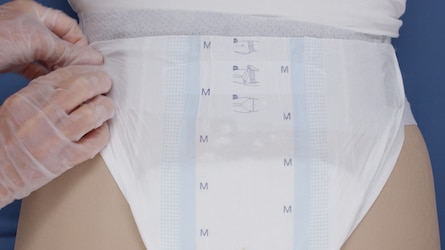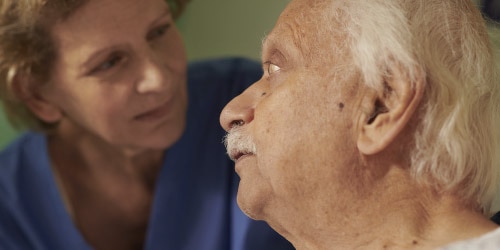Sleep helps us recover and revitalise, and repairs muscle tissue after an active and stimulating day. While resting, the immune system identifies intruding elements and "charges" the recognition of those elements into its memory, to better resist infection. Sleep also consolidates memories, making us sharper during waking hours.
What can cause frequent visits at night?
For older residents in need of special care, broken sleep patterns can lead to mood swings, impaired judgment and memory, increased sensitivity to pain, heightened risk of infection, greater risk of falling, and difficulty coping with daily activities and rehabilitation programmes.
Our bodies change as we get older and sleep becomes shallower, with a risk of frequent awakenings. Kidney function also declines and the bladder becomes less elastic, which results in needing to empty more frequently at night.
Old age also increases the risks involved with nighttime trips to the bathroom. Research1 of over 400 falls that occurred among hospitalised patients over the age of 60, showed that more than 1/3 of all falls were related to toileting and almost half of these occurred at night.
There are medical conditions and side effects of medicines that can cause and increase night time urination, such as heart and kidney disorders, diabetes, urge urinary incontinence and diuretic medicines. If you think you might have an underlying health condition, or that your medicine is causing night time urination, contact your doctor. Sometimes, a simple change in when you take your medicine can help reduce the side effects.
Insomnia can also lead to more frequent nightly urination, as more urine is produced during waking hours. There are many chronic medical conditions that can cause insomnia, such as restless legs, sleep apnoea, Alzhiemher’s and Parkinson’s.
Many chronic illnesses also cause discomfort or pain, so treating any underlying medical disorders and delivering proper pain management will benefit sleep and reduce urine production at night.
Tips for an efficient night care routine
To help your residents get a good night’s sleep, we’ve created a few steps to help minimise sleep interruptions and make your nighttime caregiving routine more efficient.
1. Start with the basics
Before going to bed, make sure your resident has emptied their bowel and bladder. They should maintain a good bowel routine during the day to reduce the risk of bowel incontinence during the night. To prevent urination throughout the night, avoid fluids two hours before bedtime. Remember that caffeine not only keeps us awake, but can also increase the need to urinate, so it’s best to reduce caffeine intake for a better night’s sleep. There are also medical conditions and side-effect of medicines that can cause and increase night time urination such as diabetes and diuretics.
For a better chance of sleeping through the night, manage their daytime sleep schedule and reduce the frequency and length of day time naps. The use of compression stockings and afternoon leg elevation can also reduce night time urination, as it helps the body to handle fluid retention which builds up throughout the day in the lower limbs.
2. Try using a night pad
If your resident is incontinent during the night, use a pad that’s specifically designed for use at night. TENA ProSkin Pants Night offers unique lie down protection with 16% more absorbency and keeps fragile skin protected for longer. 99% of caregivers say their residents stay dry all night3, and lab tests have shown them to be 32% drier after 7 hours of use4. Using TENA ProSkin Pant Night will absorb nighttime leaks if your resident isn’t able to go to the bathroom or leaks during the night without waking up.
3. Create good sleep habits
If your resident is suffering from loss of sleep, consider their activities during the day. Are they getting enough fresh air and exercise? Try to include some gentle stretching in their daily routine. Are they watching TV before bed? Try reading or listening to calm music instead. Are they drinking alcohol? Try cutting down on alcohol, because while it does induce drowsiness, it actually interferes with the body’s sleep-regulating mechanism. Make sure your resident has a wind down routine that promotes a healthy, restful state.
4. Keep your residents safe
Hurried trips to the bathroom alone at night carry a risk for older people. One solution is to install a chair-style commode next to the bed. But if that’s not feasible or desirable, make sure the resident has a clear path to the bathroom. Perhaps install motion sensor lights and remove loose hazards on the path. If your resident has dementia and night wandering is a concern, a bed alarm can alert you if the resident should wake up and wander off.
5. Take care of fragile skin
The discomfort of a nagging skin condition can have a serious impact on a resident's sleep, and may contribute to an increased need to urinate at night. To help maintain natural skin health, we’ve developed a three-step skin care solution for those living with incontinence:










